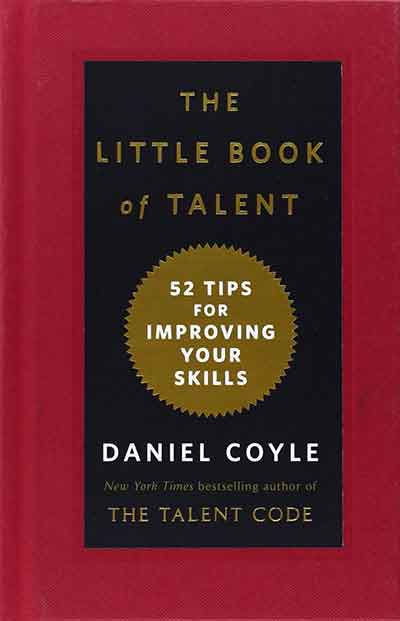 I recently read ‘The Little Book of Talent‘ by Daniel Coyle. The product of five years of reporting from the world’s greatest talent hotbeds and interviews with successful master coaches, it distills the daunting complexity of skill development into 52 clear, concise directives. Whether you’re age 10 or 100, whether you’re on the sports field or the stage, in the classroom or the corner office, this is an essential guide for anyone who ever asked, “How do I get better?”
I recently read ‘The Little Book of Talent‘ by Daniel Coyle. The product of five years of reporting from the world’s greatest talent hotbeds and interviews with successful master coaches, it distills the daunting complexity of skill development into 52 clear, concise directives. Whether you’re age 10 or 100, whether you’re on the sports field or the stage, in the classroom or the corner office, this is an essential guide for anyone who ever asked, “How do I get better?”
This is an amazing little book that you can read in as little as 90 minutes. Below are some of my favorite tips and takeaways from Daniel Coyle’s 52 tips.
Have a clear picture of your future self and spend focused time every morning thinking as vividly as possible about it.
Spend at least 15 minutes per day paying attention to other experts performing your skills. Simulate the skill by recreating the experts decision making process.
Look at every single expert in your field that you think is better than you, figure out what they’ve got that you don’t and make it yours. Focus on specifics and not generalizations.
It’s near impossible to grow and innovate working within your comfort zone. Push yourself to the edge by trying new things.
In almost every example put forward as a prodigy, there is intense and overwhelming practice and sacrifice unseen by the public. The 10,000 hour rule applies to everyone equally.
Find ways to stretch yourself to the edge of your competence. Percent of successful attempts should be 50-80%. If you tried your absolute hardest, what could you almost do? Mark the boundary of your current ability, and aim a little beyond it. That’s your spot.
Deep practice is not measured in hours or minutes. Deep practice is measured in how long you spend at the fringes of your abilities. That’s when the new connections are formed in your brain.
What’s the smallest piece of this skill that I can master? What other pieces of this skill are linked to the skill I just mastered? See the whole thing. Break it into small pieces. Put it back together.
That “almost.. almost….” sensation when operating at the edge of your competence is the very literal sensation of your brain forming new neural connections.
A tired brain is a slow brain. A tired brain makes more mistakes, hurts concentration, and leads to more shortcuts creating bad habits.
Performing should be the easy part. The reward at the end of the tunnel.
Communicating a skill to someone forces you to revisit and learn the skill more deeply.

Dallas McLaughlin
The Business Owner's Guide To
Better Decision Making
As a business owner you are inherently a decision maker and it’s a function of your job to make consistently good decisions in critical moments. But no two decisions are exactly same. Having a deep understanding of how decisions are made and having the tools to create consistent decision making frameworks are necessary to make more rapid and impactful decisions on a daily basis.